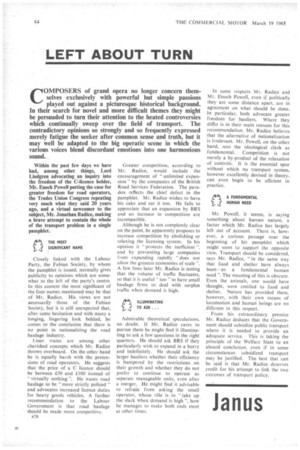LEFT ABOUT TURN
Page 86

If you've noticed an error in this article please click here to report it so we can fix it.
COMPOSERS of grand opera no longer concern themselves exclusively with powerful but simple passions played out against a picturesque historical background. In their search for novel and more difficult themes they might be persuaded to turn their attention to the heated controversies which continually sweep over the field of transport. The contradictory opinions so strongly and so frequently expressed merely fatigue the seeker after common sense and truth, but it may well be adapted to the big operatic scene in which the various voices blend discordant emotions into one harmonious sound.
Within the past few days we have had, among other things, Lord Lindgren advocating an inquiry into the freedom of the C-licence holder, Mr. Enoch Powell putting the case for greater freedom for road operators, the Trades Union Congress repeating very much what they said 20 years ago, and a virtual newcomer to the subject, Mr. Jonathan Radice, making a brave attempt to contain the whole of the transport problem in a single pamphlet.
flTHE MOST SIGNIFICANT NAME Closely linked with the Labour Party, the Fabian Society, by whom the pamphlet is issued, normally gives publicity to opinions which are somewhat to the left of the party's centre. In this context the most significant of the four names mentioned may be that of Mr. Radice. His views are not necessarily those of the Fabian Society, but it is still unexpected that, after some hesitation and with many a longing, lingering look behind, he comes to the conclusion that there is no point in nationalizing the road haulage industry.
Liner trains are among other cherished concepts which Mr. Radice throws overboard. On the other hand he is equally harsh with the pretensions of road operators. He suggests that the price of a C licence should be between £50 and £100 instead of "virtually nothing ". He wants road haulage to be "more strictly policed" and advocates increased licence duties for heavy goods vehicles. A further recommendation to the Labour Government is that road haulage should be made more competitive.
n28 Greater competition, according to Mr. Radice, would include the encouragement of "unlimited expansion" by the companies of the British Road Services Federation. The paradox reflects the chief defect in the pamphlet. Mr. Radice wishes to have his cake and eat it too. He fails to appreciate that an expansion by BRS and an increase in competition are incompatible.
Although he is not completely clear on the point, he apparently proposes to increase competition by abolishing or relaxing the licensing system. In his opinion it " protects the inefficient ", and by preventing large companies from expanding rapidly "does not allow the greatest economies of scale ". A few lines later Mr. Radice is noting that the volume of traffic fluctuates, so that it is useful" too " to have small haulage firms to deal with surplus traffic when demand is high.
nILLUMINATING TO ASK...
Admirable theoretical speculations, no doubt. If Mr. Radice cares to pursue them he might find it illuminating to ask a few questions in the right quarters. He should ask BRS if they particularly wish to expand in a hurry and indefinitely. He should ask the larger hauliers whether their efficiency is hampered by the restrictions on their growth and whether they do not prefer to continue to operate as separate manageable units, even after a merger. He might find it advisable to refrain from asking the small operator, whose role is to "take up the slack when demand is high ", how he manages to make both ends meet at other times. In some respects Mr. Radice and Mr. Enoch Powell, even if politically they are some distance apart, are in agreement on what should be done. In particular, both advocate greater freedom for hauliers. Where they differ is in their main reasons for this recommendation. Mr. Radice believes that the alternative of nationalization is irrelevant. Mr. Powell, on the other hand, sees the ideological clash as fundamental. Competition is not merely a by-product of the relaxation of controls. It is the essential spur without which no transport system, however excellently devised in theory, can even begin to be efficient in practice.
A FUNDAMENTAL HUMAN NEED
Mr. Powell, it seems, is saying something about human nature, a factor which Mr. Radice has largely left out of account. There is, however, a curious passage near the beginning of his pamphlet which might seem to support the opposite view. Transport should be considered, says Mr. Radice, "in the same way that food and shelter have always been—as a fundamental human need ". The meaning of this is obscure. Even the animals, one would have thought, were entitled to food and shelter. Nature has provided them, however, with their own means of locomotion and human beings are no different in this respect.
• From his extraordinary premise Mr. Radice deduces that the Government should subsidize public transport where it is needed to provide an adequate service. This is taking the principle of the Welfare State to an absurd conclusion, even if in some circumstances subsidized transport may be justified. The best that can be said is that Mr. Radice deserves credit for his attempt to link the two extremes of transport policy.












































































































































